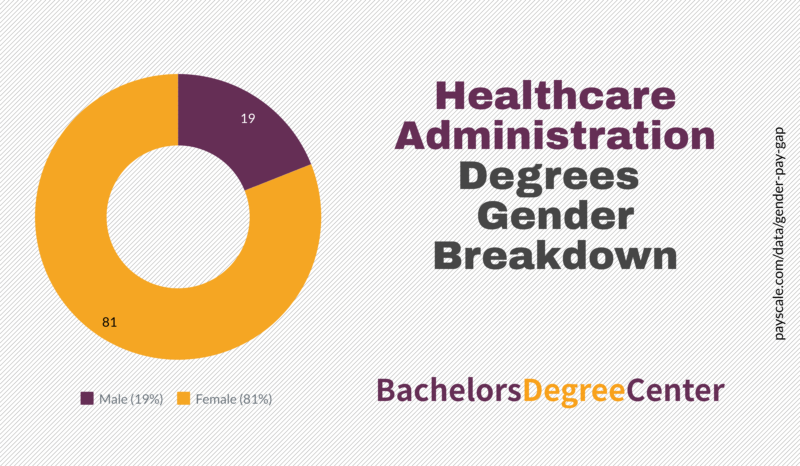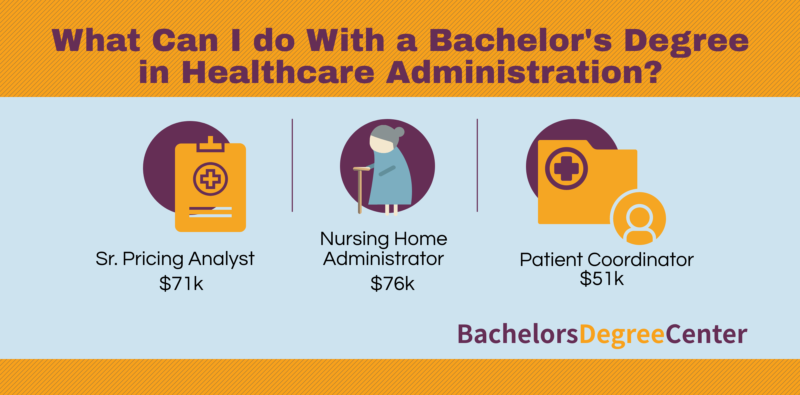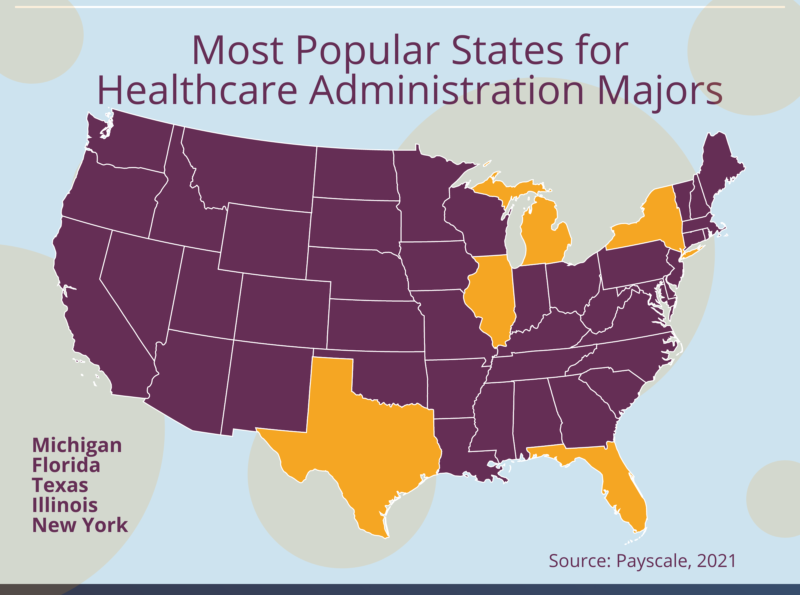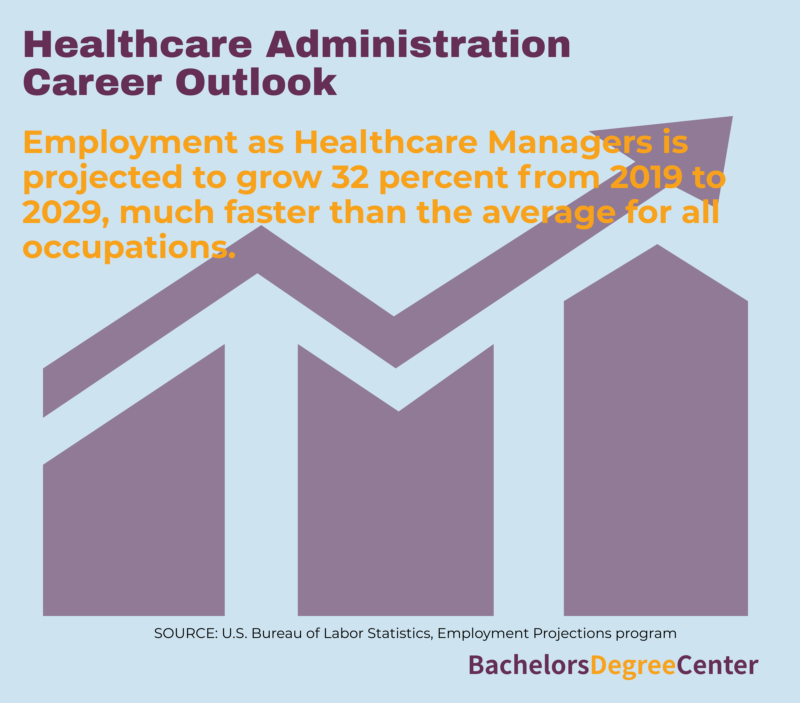Key Information:
- A healthcare management degree opens various career paths in hospitals, government agencies, and corporate settings, including roles in healthcare administration and management.
- Students can pursue a Bachelor of Science or Bachelor of Arts in healthcare administration, often leading to roles in hospital operations, healthcare human resources, and medical administration.
- Many continue to postgraduate studies for advanced career opportunities.Choosing accredited programs is crucial for quality education and career advancement. The Commission on Accreditation of Healthcare Management Education (CAHME) is a key accreditor ensuring rigorous academic standards.
A career in healthcare management can be very lucrative. Students who achieve a bachelor’s degree in the field can typically find jobs as entry-level employees in healthcare management or administration departments. In order to advance in the field, many students go on to obtain their postgraduate degrees or certifications.
What is Healthcare Management?
Healthcare management includes work in government agencies, hospitals, and accreditation boards. Healthcare managers and administrators come from a variety of backgrounds. Some start out as the healthcare industry professionals such as doctors and nurses. Others studied public health and go on to get their master’s degree at a later date.
This healthcare management definition encompasses a variety of positions in the field. Healthcare managers might oversee doctors and nurses in a clinical setting such as a hospital or work in corporate positions such as insurance and staffing agencies.

Healthcare Management vs Healthcare Administration
What is healthcare management versus administration? Healthcare managers run healthcare organizations. On the other hand, healthcare administers handle staffing needs. There are several sub-areas within both of these fields, and it may take years of experience and additional education to become qualified for a leadership role in healthcare.
Major in Healthcare Administration
A major in healthcare administration includes both Bachelor of Arts and a Bachelor of Science alternatives. Student should tailor their education to support career goals in healthcare administration.
Majoring in healthcare administration allows students to dive into political, social, legal and ethical factors that shape healthcare systems. Graduates in this field go on to work in hospital operations, medical administration, healthcare human resources and similar fields. Students who go on to complete their postgraduate studies often concentrate on economics, leadership, finance, quality of care improvement, law, public health and human resources.
Now that the healthcare management definition has been covered, it’s important to understand the difference between healthcare management vs healthcare administration. Beyond the obvious difference of different degrees (major in healthcare administration or management), there is typically a difference in experience levels. Healthcare managers often having higher degrees and more years of progressive experience.
Those with career goals in healthcare administration can do several things to advance their careers, such as:
- Engage in Volunteer Work
- Add Related Work Experience
- Get a master’s degree or certification
- Gain leadership skills
The daily activities of a health administrator depend on what organization they work for. The core of the job typically includes facilitating smooth operations in a hospital system or healthcare environment. Healthcare managers and administrators have a wide range of coordinating and planning responsibilities. These positions require a deep understanding of healthcare laws and policies. Daily responsibilities also include holding meetings with investors or words of directors, as well as supervising deputy or assistant administrators.
Healthcare administrators often tend to staff scheduling, patient fees, and billing and record-keeping. They may work for enormous corporations or at a specific facility or medical practice.
School/Program Accreditation
Students should look for schools with regional or national accreditation. Colleges and universities of good repute receive accreditation from one of the six regional accreditation boards. Regional accreditors validate the credentials of public and private schools and help ensure that students will receive a quality education. It’s difficult to get student loans or scholarships from nonaccredited schools. Therefore, this is an important designation. Employers also respect college degrees from accredited universities. There are national accreditations for individual programs such as hospital administration or healthcare management.
The best schools for healthcare administration undergraduate degrees hold several accreditations at the regional and national levels. Students can refer to the Department of Education’s accreditation database to see whether schools they are interested in have the proper credentials.
Healthcare administration colleges often offer courses on campus or online. With the healthcare management major, students often choose the flexibility of online degrees so that they can work or attend to family responsibilities. With a bachelors degree in healthcare management, students learn marketing, human resources and accounting among many other subjects. There are also many concentrations to help graduates pursue their career goals.
Health Administration Degree Requirements
Each program is unique, but there tend to be certain similarities between Health Administration degree requirements. For example, students may learn about economics, health services organizations, political, historic and scientific and general education subjects. Typically, it takes 120 credits to obtain a baccalaureate degree in Health Administration.
Healthcare management degree schools often offer a number of specializations. Students should also search for schools with great support in terms of proactive advisors. This is a key feature of accredited online healthcare degrees that propels students into successful healthcare management degrees.
The best online schools for healthcare management will also have accreditation from organizations such as the Commission on Accreditation of Healthcare Management Education. CAHME accredited online programs ensure that students receive the field experience and curriculum needed to obtain entry-level positions or advance to leadership roles if they already work in healthcare. Additionally, choosing a school with CAHME accreditation ensures that students can transfer their credits to another reputable school. Scholarships also pay attention to the types of accreditations of online schools and colleges.
The best schools for healthcare administration undergraduate degrees will have multiple accreditations at the national and regional level as well as accreditations specific to healthcare administration or management.
Here are some of the undergraduate degrees that kick off a career in healthcare administration and management:
- Healthcare Administration
- Health Information Management
- Nursing
- Public Health Administration
- Business Administration
Qualifications for Healthcare Administration Colleges
To qualify for a healthcare management major, students complete all of the healthcare and general education requirements determined by each school. Health administration degree requirements also typically improve maintaining a minimum GPA.
In order to become a healthcare administrator, students can start out with their bachelor’s degree. However, this usually leads to entry-level positions that allow graduates to prove themselves and move up in the organization. Many but not all healthcare administrators go on to complete their master’s degree, which takes two years when completed online full time.
Students should look at a number of factors when choosing between healthcare management degree schools. However, it’s inadvisable to attend a school that does not have accredited online healthcare degrees. CAHME accredited online programs are the best online schools for healthcare management.
The Commission on Accreditation of Healthcare Management Education aims to further the quality of healthcare by producing effective healthcare managers and administrators. CAHME consist of clinical, educational and professional organizations who want to improve the quality of healthcare leadership.
Founded in 1968, CAHME accreditation has raised the bar on healthcare management standards.
CAHME’s mission includes setting measurable criteria for colleges and universities to meet. The organization also supports and advises programs that wants to exceed the criteria and cultivate an environment of continuous improvement.
Types of Healthcare Administration/Management Degrees
To obtain a BS healthcare administration, students will master a number of topics including healthcare finance, healthcare ethics, quality management, public health and healthcare marketing. A bachelor of health administration is the minimum education threshold for those who wish to obtain a masters in the same field.
Individuals who complete a bachelor of healthcare management develop the skills they need to succeed in the job. Healthcare managers need to understand accounting and human resources as well as marketing. marketing for healthcare organizations is a special expertise requiring sensitivity and deep knowledge of the industry as well as understanding of public health needs.
What is a healthcare administration degree? With a Bachelor of Science in healthcare management, students learn the day-to-day operations of healthcare facilities. They also learn about the economic and financial aspects of healthcare.
Many students choose to pursue online healthcare degrees. With a healthcare administration degree online, students have a lot of flexibility in terms of when they will review course material and complete their assignments. Typically, healthcare management degree online programs offer part-time and full-time options so that students can balance their work, life, and educational responsibilities.
An online healthcare management degree offers the same high-quality instruction as on campus programs at accredited universities. Sometimes, these programs are called online hospital management degree programs. These programs often include classes in science, math, general humanities, communication and social sciences as well as core programs for the major.
Students don’t need work experience in the field to obtain their degree in healthcare management or administration. However, the schools and universities consider the GPA of candidates and a high school diploma or GED is a necessity.
From planning and development of healthcare programs to staffing and healthcare accounting, an online healthcare administration degree prepares students for a wide diversity of job activities. Students who choose online healthcare management can do as well as those who attend classes on a campus. However, it does take more organization and self-discipline to complete an online bachelors in healthcare management.
With a BS healthcare administration, students can qualify for entry-level positions in the field. However, many positions require higher educational requirements than a bachelor of health administration. this is something for students to take into account as they plan their academic careers.
With a bachelor of healthcare management, students set themselves up for a long and successful career in healthcare administration or management. Similarly, students can concentrate on staffing concerns when they choose a bachelor of science healthcare administration.
With a bachelors of science in healthcare management, students gain the skill, knowledge and confidence to become leaders in the field. Online healthcare degrees allow students to continue working while obtaining their education. With a healthcare administration degree online from a respected college or university, students will receive the consideration of potential employers and graduate colleges and universities.
Students shouldn’t hesitate to complete their healthcare management degree online. however, as with any college or university some programs are better than others. Therefore, it’s important for students to carefully vet out their top choices for an online healthcare management degree.
Online healthcare management programs offer a variety of formats and concentrations. For example, some online hospital management degree programs allow students to attend both online and on campus classes. This provides a great deal of flexibility for those who want an online healthcare administration degree with options to attend classes in person.
Online healthcare management programs are convenient and often more realistic for students who already have other life obligations. With an online bachelors in healthcare management, adults can also change career focus and enter the healthcare field.
Certifications/Licenses
What is the best certification for healthcare management? Here are five valuable certifications to advance in this field:
- Fellow of the American College of Healthcare Executives (FACHE)
- Certified Medical Manager (CMM)
- Certified Professional in Healthcare Risk Management (CPHRM)
- Certified Professional in Healthcare Information and Management Systems (CPHIMS)
With aging baby boomers and numerous changes in regulation, healthcare is a constantly evolving field. Certifications in healthcare management prepare graduates to meet the demands of today’s healthcare industry.
Students who want to work for specific employers should find out what certifications will serve them best. There are many different kinds of healthcare management online courses to choose from.
Earn Your Healthcare Management Certificate Online
For those who are passionate about helping people and improving the quality of healthcare, a healthcare management certification online allows them to deepen their knowledge and take the latest best practices back to their current or future employers.
Many students love the practicality and convenience of getting an online healthcare management certificate.

Careers in Healthcare Administration and Management
Healthcare management jobs include planning and managing medical services and staff. Health care administrators act as coordinators for nurses, doctors and others working in the healthcare profession. This requires a great deal of industry knowledge, confidence and flexibility.
Entry-level healthcare management jobs often include administrative tasks in HR, finance or other departments of hospitals, corporations and healthcare facilities.
Here are some of the job responsibilities of healthcare administrators and managers:
- Scheduling work shifts
- Managing budgets
- Quality control
- Training and supervising staff
- Maintaining healthcare records
- Ensuring compliance with healthcare laws
Bachelors in healthcare administration jobs are somewhat limited for new graduates. After obtaining a few years of experience, graduates can often move up within their organization. Many others go on to pursue higher degrees, which make them better candidates when leadership positions open up.
Some of the skills required by health care administrators include organization, leadership ability, financial acumen and specific knowledge of the healthcare system. Health care administrators deal with staffing, facilities issues and billing among many other responsibilities. They are typically responsible for putting together and maintaining an accurate budget, for example.
A medical office administrator often has the same responsibilities as someone who works in a hospital or larger facility. Although the scope may be smaller, those working in private offices often have a wider breadth of responsibilities.
Due to the unique nature of billing systems and patient records, it’s important for those with aspirations of becoming managers and health care to have extensive computer literacy.
A comprehensive list of healthcare management careers would be too long to include in this document. However, here is a sampling of career opportunities in the field:
- Healthcare Department Manager
- Operations Assistant
- Healthcare Finance Manager
- Quality and Improvement Manager
- Healthcare Administrator
- Patient Service Representative
- Physician Practice Manager
- Administrative Coordinator
- Administrative Support Specialist
- Medical Secretary
The health care management career path extends beyond getting a four-year degree. Students must also obtain the necessary experience to become knowledgeable in the field and leadership experience is also important for those who want to explore healthcare administration career options.
With a bachelors in healthcare management jobs that opened up to graduates include entry-level jobs in healthcare administration. For example, bachelor of science in healthcare administration jobs include everything from medical secretary to the administrator of a large hospital. It’s important to know that many employers prefer applicants with a higher degree than a BS or BA.
It’s a good idea for students to review a bachelor of science in healthcare administration job description for facilities or organizations they might want to work for. Bachelor of science in business administration healthcare management jobs may include promotions from a lower-level position or job opportunities that come up after students obtain a few years of experience and decide to move to a new organization.
Healthcare management jobs Include many different levels our positions. The good thing is that even those who start out in entry-level healthcare management jobs often rise to supervisory roles when they show talent, initiative and skill.
Bachelors in healthcare administration jobs can be quite lucrative, as seen in the next section. Medical office administrator positions and hospital administrator positions can both pay lucrative salaries.
As seen from the partial list of healthcare management careers above, there’s a lot of diversity for those who choose the healthcare management career path. Healthcare administration career options include opportunities for research and development, direct contact with first responders such as doctors and nurses and other jobs that make bachelors in healthcare management jobs rewarding and exciting.
As with most degrees, students who graduate with healthcare management or administrator degrees typically have to start out in entry-level jobs in healthcare administration. How fast graduates advance from bachelor of science in healthcare administration jobs to leadership positions often depends on a number of factors such as the type of facility they work in, open positions and their job performance.
There are many areas in which healthcare administration graduates may work, including:
- medical facilities
- healthcare providers
- insurance companies
- community health education
- healthcare services
- nursing homes
And a healthcare administration graduate may not even work in a conventional patient care role. There are many non-medical healthcare careers. They may become
- social workers
- sales representative
- health information technician
- biomedical engineers
- medical records
- pharmacists
- healthcare informatics technologist
You don’t have to be a physician assistant or registered nurse; there are many healthcare jobs that don’t require medical school, and aren’t even in the medical field. And their job growth, median salary, average salary, and other stats can compare to other medical professionals.
A bachelor of science in healthcare administration job description shows great diversity in the day-to-day activity. Bachelor of science in business administration healthcare management jobs may include meeting with a board of directors or directly overseeing the fulfillment of open staffing requisitions. It all depends on the needs of the employer and the skills of each individual.
Of course, you may choose to go on to a graduate degree. If you started with an associate degree, you may leap all the way to a master’s and even get reimbursement from your employers.
Salary for Healthcare Management Professionals
The average healthcare administration careers salary varies depending on whether graduates take jobs in urban or suburban areas. For example, a hospital department manager salary in a small town versus a large city could vary greatly. Typically, those working in more populated areas make higher incomes.
Nevertheless, the BLS provides meaningful information on health care management major salary ranges. With a baccalaureate degree or higher, students can obtain lucrative jobs in the field.
A bachelors in healthcare administration salary average is $104,000 for those with executive positions in hospitals, government agencies, private practices or corporations. Entry-level positions pay around $60,000 while top earners make nearly $200,000, according to the BLS. As you can see, there’s a lot of incentive to pursue a healthcare management degree salary.
Graduates working in government positions make about $116,000. Meanwhile, those working in hospitals or for private practices average $113,000. A healthcare management degree salary remains lucrative no matter what vertical graduates end up in. For example, a bachelors in healthcare administration salary for outpatient centers is over $100,000. Students who want to advance to higher positions often look for an affordable online masters in healthcare administration. An affordable online masters in healthcare administration is a great career investment.
A hospital department manager salary often commands over six figures as well. Those working in physician’s offices might make a little under $100,000, but also enjoy a more relaxed atmosphere than most hospitals and other health care facilities.
Healthcare administration careers salary is one of the main reasons that people choose to go into this field. A healthcare management major salary is well above average wages in the United States.

Professional Organizations
There are many professional organizations that can provide opportunities for continuing education, publications specific to the field and networking opportunities to healthcare administrators and managers.
Here are a few of the top professional organizations for graduates to consider:
- American College of Healthcare Executives (ACHE)
- Healthcare Administrators Association (HCAA)
- American Health Information Management Association (AHIMA)
- The Healthcare Financial Management Association (HFMA)
- The National Association of Healthcare Access Management (NAHAM)
- The American Association of Healthcare Administrative Management (AAHAM)
Related Rankings:
Best Bachelor’s in Healthcare Administration
Top Online Bachelor’s in Healthcare Administration

